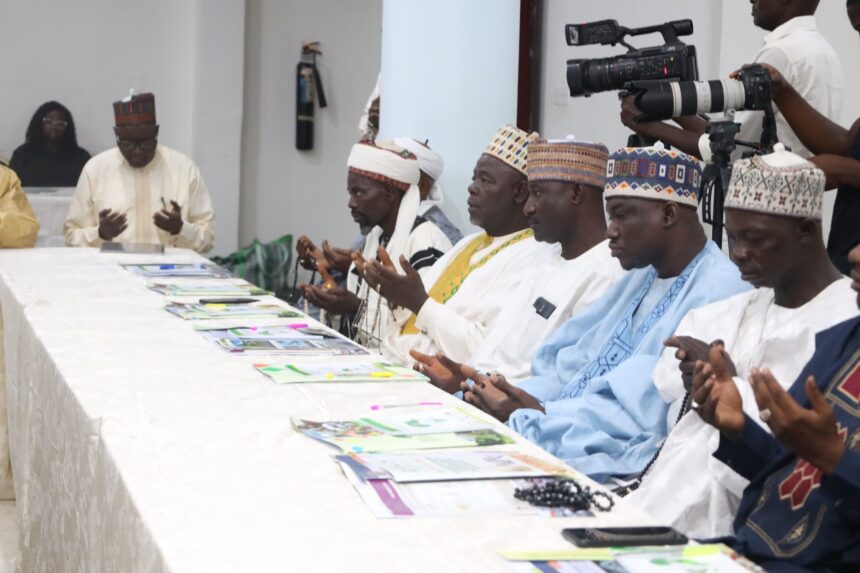By Onche Odeh
The religious community in Nigeria has been drawn into the spotlight in the debate about the safety of Genetically Modified Organism (GMOs), with scientists saying their voices matter even on issues of scientific concerns.
This was the crux of the conversation during a one-day workshop convened by the Nigerian Chapter of the Open Forum on African Biotechnology (OFAB) Nigeria in Abuja for Islamic clerics to share perspectives on Genetic Modification and the products, especially those developed and commercialized in Nigeria.
Director, Agricultural Biotechnology at Nigeria’s National Biotechnology Research and Development Agency (NBRDA), Dr. Rose Gidado, who spoke on the connection between religion and science and how this links to the debate on GMOs said religious communities often have strong moral and ethical frameworks that can inform discussions around the subject.
In a response to AfricaSTI sequel to her presentation on the day, Dr. Gidado said, “Religious teachings can shape attitudes towards nature, human life, and the environment, influencing perspectives on GMOs,” adding also that religious leaders and communities can play a crucial role in raising awareness and facilitating discussions around genetic modification.
According to her, voices of religious leaders matter because they are often trusted and respected within their communities, making their voices influential in shaping public opinion.
“Religious teachings can provide moral guidance on issues like the responsible use of technology and the protection of human life and the environment, just as the religious communities bring diverse perspectives and values to the discussion, enriching the debate and ensuring that various viewpoints are considered.”
“Some religious communities may view GMOs as a potential threat to the natural order or the stewardship of creation. Their leaders may express concerns about the potential impact of GMOs on human health and safety, while others may worry about the potential environmental consequences of GMOs, such as unintended effects on ecosystems.
“However, with collaborations between religious communities and scientists can lead to more informed decision-making and a more nuanced understanding of GMOs that can help build trust in scientific institutions and promote a more positive perception of GMOs,” Dr. Gidado stated.
She said by engaging with religious communities and considering their perspectives, Nigeria is on the path to fostering a more inclusive and informed discussion about GMOs, ultimately leading to more responsible and sustainable development and deployment of the technologies.
Three GM crops developed by scientists in Nigeria in collaboration with partners in renowned institutions have been commercialized in the country. These include the TELA Maize, Bt Cotton and the Pod Borer Resistant (PBR) Cowpea.
Amid the cacophony of voices around the adoption of genetic engineering in Nigeria, religious leaders in the country have exhibited diverse views on its products, GMOs. While some embrace biotechnology as a tool for addressing food insecurity, others caution against its potential ethical and health implications.
In response, experts and stakeholders have said that ongoing dialogue and education are essential to navigate these complex perspectives and inform policy decisions.
In her presentation during the workshop for the clerics, Dr. Gidado explained to that Biotechnology is a multidisciplinary pursuit that has emerged as a demanding industry during the recent past.
She said, besides being a branch of advance biological sciences, it has attracted many multinational companies including those that are concerned with the production of pharmaceutical products for the cure or control of many human diseases. She listed some of the the products of biotechnology to include antibiotics, vaccines, life-saving drugs and gene therapy.
“Advances in biotechnology has brough about improvement of clinical testing and diagnostic tools, and production of novel varieties of crop plants and Livestock,” she stated.
She said the application of biotechnology in agriculture has helped countries, including Nigeria to improve crops, livestock, and farming practices.
She stressed that, the goal of agricultural biotechnology is to increase crop yields, improve food quality, and reduce the environmental impact of farming, ultimately contributing to global food security and sustainable agriculture.
On safety and other concerns raised about GM crops, she said, “GM crops are rigorously tested for safety and regulated by governments worldwide. GM crops can be made accessible to smallholder farmers through public-private partnerships.”





